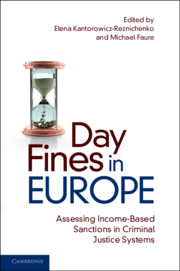Book contents
- Day Fines in Europe
- Day Fines in Europe
- Copyright page
- Contents
- Figures
- Tables
- Contributors
- Acknowledgements
- Abbreviations
- 1 Introduction
- 2 Theoretical Perspectives on Day Fines
- 3 Day Fines in Finland
- 4 Day Fines in Sweden
- 5 Day Fines in Denmark
- 6 Day Fines in Germany
- 7 Day Fines in Austria
- 8 Day Fines in Hungary
- 9 Day Fines in France
- 10 Day Fines in Portugal
- 11 Day (Unit) Fines in England and Wales
- 12 Day Fines in Slovenia
- 13 Day Fines in Spain
- 14 Day Fines in Poland
- 15 Day Fines in Croatia
- 16 Day Fines in Switzerland
- 17 Day Fines in Czech Republic
- 18 Day Fines in Romania
- 19 Comparative Law and Economics Perspective on Day Fines
- Index
- References
15 - Day Fines in Croatia
Published online by Cambridge University Press: 11 June 2021
- Day Fines in Europe
- Day Fines in Europe
- Copyright page
- Contents
- Figures
- Tables
- Contributors
- Acknowledgements
- Abbreviations
- 1 Introduction
- 2 Theoretical Perspectives on Day Fines
- 3 Day Fines in Finland
- 4 Day Fines in Sweden
- 5 Day Fines in Denmark
- 6 Day Fines in Germany
- 7 Day Fines in Austria
- 8 Day Fines in Hungary
- 9 Day Fines in France
- 10 Day Fines in Portugal
- 11 Day (Unit) Fines in England and Wales
- 12 Day Fines in Slovenia
- 13 Day Fines in Spain
- 14 Day Fines in Poland
- 15 Day Fines in Croatia
- 16 Day Fines in Switzerland
- 17 Day Fines in Czech Republic
- 18 Day Fines in Romania
- 19 Comparative Law and Economics Perspective on Day Fines
- Index
- References
Summary
This chapter provides a comprehensive overview of the system of day fines in Croatia. Before explaining the current legal framework, it describes the historical role of the fine as a criminal punishment in Croatia and elucidates the reasons which in 1997 led to the switch from the system of fixed fines to day fines. This fundamental change sought not only to modernize fine as punishment, but also to address a sharply negative trend in the number of pronounced fines, which started in the early 1990s. Yet, the latter was not achieved as the share of fines in the overall percentage of criminal sanctions continued to decline. In 2011 an entirely new Criminal Code significantly amended the regulation of the fine, as systematically outlined in this chapter. One of the main goals of this reform was to avoid reliance of judges on the average daily income instead of determining the real income of the perpetrator – a legally-provided exception which quickly became a rule, thus negating the essence of the system of day fines. The 2011 legislative improvements, however, did not contribute to its increased use, leading to conclusion that the system of day fines has not yet become deep-rooted in Croatia.
Keywords
- Type
- Chapter
- Information
- Day Fines in EuropeAssessing Income-Based Sanctions in Criminal Justice Systems, pp. 284 - 305Publisher: Cambridge University PressPrint publication year: 2021

